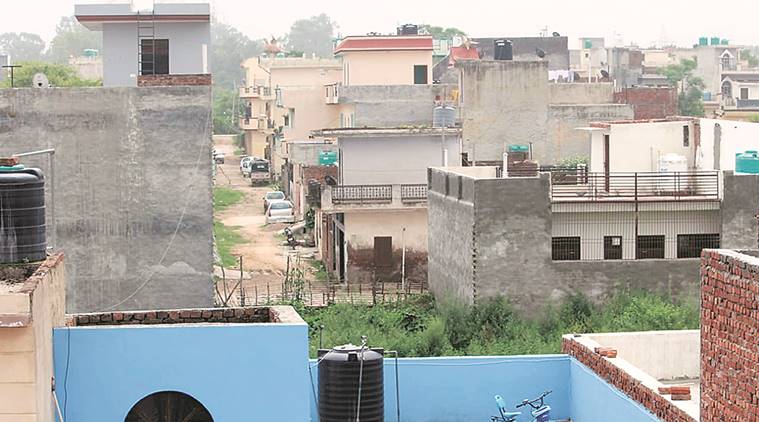 Still waiting for development: At Guru Nanak Colony on Mubarikpur road in Derabassi. (Express)
Still waiting for development: At Guru Nanak Colony on Mubarikpur road in Derabassi. (Express)
The Punjab government’s July 31 decision of regularising nearly 8,000 unauthorised colonies across the state, is going to impact 95 such colonies in the Mohali district. Out of these, Derabassi sub-division leads with 57 such unauthorised colonies, followed by 28 and 10 in Mohali and Kharar sub-divisions, respectively.
Unauthorised colonies, which came up before March 19, 2018, and where more than 25 per cent of plots had already been sold, shall be covered under the state government’s recently announced regularisation policy.
While occupants of the plots in such unauthorised colonies, who had been living in a state of uncertainty to date, stand relieved with this decision, Greater Mohali Development Authority (GMADA) officers say they shall now be taking adequate measures to prevent any more such unauthorised colonies from coming up. Builders who fail to get their colonies approved under this regularisation policy will have to face penal action, GMADA officers say.
“A large number of unauthorised colonies came up across Mohali district from 2005 till 2014. This period witnessed a phenomenal property boom in this region. The lackadaisical approach of the government’s regulatory authorities, ample availability of land at cheaper prices in unauthorised colonies as compared to authorised ones, led to a spurt in such colonies. Many people started buying plots for investment purposes. The precedents of regularisation of unauthorised colonies whenever the government changes also added to the buyer’s and seller’s confidence levels. But the problems arose for the end users — people who bought the plots, constructed houses and started living there. Lack of basic amenities, inadequate sewage network, poor road infrastructure and problems of erratic water and power supply added to their woes,” said Shailender Anand, former president of Mohali Property Consultants’ Association.
Despite all this, GMADA, which should have acted in the first place, failed to do so. In order to take full advantage of the property boom period, builders bought agricultural land in Mohali, Kharar and Derabassi areas and started selling plots.
“For instance, if prevalent land price in these areas was between Rs 14,000-Rs 25,000 per square yard, one could get a plot at the rate of Rs 6,000 per square yard in an unauthorised colony. Such lucrative price tag attracted people who were looking to buy a piece of land,” added Mahavir Singh Dhillon, another property consultant.
This year, GMADA had also recommended registration of an FIR against a Nayagaon-based developer, M/S Imperial Golf Greens. GMADA’s Chief Administrator (GMADA) wrote a letter to the police for taking action against the builder in March this year. Expect this one FIR, no action was initiated against any of the unauthorised builders across the district.
Mohali’s Additional Deputy Commissioner (ADC) Charandev Singh Mann said, “If the district administration takes action against illegal builders, then people who are living there will suffer. Through this regularisation policy, government has given an opportunity to such builders to get their colonies approved. Developers should apply under the new policy, pay the requisite Change of Land Use fee, get registered with GMADA or their local Municipal Council and get the required clearances. If the builders still fail to do so, GMADA shall initiate action. In that case, people tend to lose their power and water connections.”
Questions raised on revenue department’s functioning
Despite buying a plot in an unauthorised colony, people could easily get their plot registered in their names. Based on the registered deed, they got electricity connections.
Mahavir Singh Dhillon said, “There should be clear instructions to the revenue department not to register plots located in unauthorised colonies. Banks should also refrain from giving loans to people for buying plots in such colonies. Although government banks do not give loan in unauthorised colonies, some of the private banks, finance companies do not hesitate and give loans. There should be some check on this as well.”
ADC Charandev Singh Mann said, “A few years back, the policies were not that stringent as they are today. In most of the cases, an individual owner of a plot used to apply for the registration in his/her name. Thus, the revenue department used to register the property in owner’s name. Since the price at which the owner had bought a plot was comparatively cheaper than in authorised colonies, many did not mind the poor infrastructure and lack of basic amenities. In some cases, people claimed they were cheated as they were not aware if the colony was unauthorised. But, nowadays, we have started putting up a list of authorised and unauthorised colonies on GMADA’s website. Still, if anybody buys a plot in an unauthorised colony, he/she is willingly calling for trouble.”